Millennials are the largest generation in the workforce and growing. It's important to understand their view on business and personal career development - what's changing and what's staying the same. Deloitte's 2018 Millennial Survey is a good place for insights and ideas. This year's results suggest a declining sentiment. We need to understand more.
So if you work with, report to, work for or are a millennial the 2018 Millennial Survey from Deloitte is worth a look. If you are thinking that list includes nearly everyone working, you’re right. Afterall, we’re talking about the largest living generation in the US.
And, there is change afoot. This year’s results show a notable decline in sentiment from millennials.
There is some fatigue about what millennials are looking for and why. There is no “do this” or “do that” here for millennials or the rest of us. Instead, the focus is understanding themes and trends.
Knowing what’s on the minds for over a third of the US workforce and some reflection about a way forward makes nothing but sense.
Remind Me Again Who Is Technically A Millennial
There are some slight variations, but you can comfortably think of millennials as ages 23-37. They represent 1/3 of the workforce. They are the largest generation in the current U.S. labor force. This 1/3 representation will increase in the next 1o years as baby boomers leave the workforce.
The Generation Z (or post-millennials) are just entering the workforce. The oldest GenZ’s are 22.
Old And Young Millennials
Ages 23-37 is a broad age category. If you know any 23-year-olds and 36-year-olds, you know how different their realities.
CNN’s piece entitled Snapchat? No Thanks; I’m An Old Millennial talks about old (29 or older) and young (ages 23-28) millennials. They assert that smartphones and the financial crisis affected the old and young quite differently.
Thinking about millennials as a homogeneous group is a mistake. These trends resonate from and affect sections of the broader group and individuals in different ways.
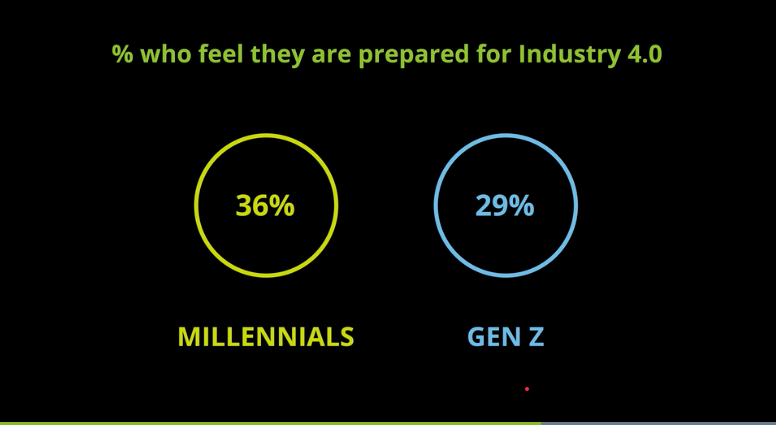
7 Years Running For The Deloitte Millennial Survey
This year’s survey includes responses from over 10,000, millennials and 2,000 genZ’s.
Deloitte reports two critical headlines from the 2018 Millennial survey:
- uneasy, pessimistic, and concerned
- disappointed in business and unprepared for Industry 4.0.
Also, the findings showed quite a downward trend from last year. The report suggests:
…a fragmenting social and political environment and profound changes driven by the Fourth Industrial Revolution, or Industry 4.0…
underpin the decline.
And The Survey Says – The Three Main Findings
Click here for a PDF of the full report.
1) Perceptions have reversed
This year’s results declined notably from what was a positive trend in the prior few years. There is a sizable gap between what millennials/genZ’s view companies should be doing and are prioritizing.

2) Diversity and flexibility drive loyalty
While good pay and supportive cultures are # 1 and #2 to attract millennials and genZ’s, diversity, inclusion, and flexibility are crucial to retaining them. Further, they are pessimistic about the ability of employers to deliver an inclusive work environment despite openly expressing commitment.
3) Unprepared for the new workplace
Young workers don’t feel prepared for demands of the evolving workplace. Deloitte refers to this evolving workplace as Industry 4.0. Their development priorities – soft skills – might surprise you.
If you are interested in more about Industry 4.0, as I was, check out: What Everyone Must Know About Industry 4.0
Millennial’s Opinions About Business
Millennials and genZ’s have an unfavorable view of business overall. It’s also trending significantly down over last year.
A few specifics:
- Only 48% believe corporations behave ethically (versus 65 percent last year).
- 47% think business leaders are committed to helping improve society (versus 62 percent last year).
- 66% say companies have no interest beyond making money (versus 50% last year).
Yikes.
Despite the slide in the results, millennials/genZ’s view business leaders as more likely to make a difference in the world over other leaders (e.g., political, religious).
Beyond The Headlines: Diversity And Loyalty
For millennials, diversity isn’t about quotas. Instead, it is about a progressive mindset. They see diversity and inclusion as a tool for driving performance. (Go figure!)
Regarding the survey:
- The more diverse their senior management team, the more favorable the responses to people development.
- Organizational diversity and a diverse senior leadership team positively influence employee loyalty.
- Loyalty levels decreased to levels from two years ago.
Diversity Impact: Percent of respondents saying they would stay beyond five years:

Loyalty Trends:
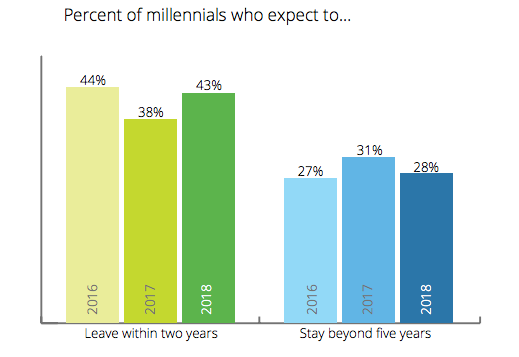
Younger workers need positive reasons to stay with their employers – Deloitte 2018 Millennial Survey
Diversity and flexibility represent an opportunity.
Implications – For All Of This
The completely obvious in all this, millennials and genZ’s are the present and even more so the future.
Organizations that succeed in attracting, engaging and retaining the next generations stand a much higher chance of success. Some of the macro issues require global strategies and mandates; others can be influenced now and in every day.
Deloitte’s survey suggests the following three strategies to help attract and retain:
1. Consider decision-making priorities
The leading priorities for millennials and genZ’s are:
- Pay
- Culture
- Flexibility
Figuring a proper mix will be essential.
2. Increased flexibility (where and when they work) and diversity will help retain:
The opportunity here is to “prove them wrong.”
I understand the skepticism of the next generations. I’m personally very dubious about corporate America’s ability to accelerate progress with diversity. That said, I’m bullish they can help turn the tide and help do so with some staying power.
Finally, leaders formal or otherwise make decisions about being open or closed-minded every day. They shape the work environment which drives decisions on flexibility and inclusion. Change can happen, and it can spread.
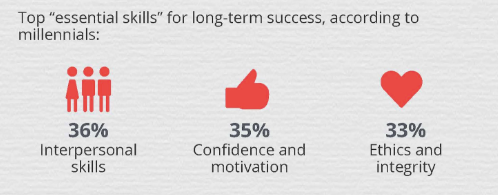
3. Help with soft skills to prepare for Industry 4.0:
In their view, businesses aren’t sufficiently focusing on development. Most important, the skills millennial’s expect to need include:
- Interpersonal skills
- Building confidence
- Ethics/integrity aptitude
The survey explains this focus on soft skills this way.
Though technology is increasingly augmenting work today, respondents are looking for guidance that’s far broader than how to use that technology. Perhaps sensing that automation can free them from repetitive and mundane tasks to focus on assignments that require a more personal touch
Now What
There is no simple answer are quick fixes here. But, each of us is connected to the challenges and solutions.
For me, the now (or so) what has four dimensions:
- Stay curious and informed about the trends and upstream influences.
- Be in touch with reality (e.g., those you work with). None of the generations are monolithic groups, and surveys don’t tell the whole story.
- Remain open-minded to new approaches and mindsets.
- Operate with a bias for action on that which you can do to make the workplace better for the next gen! In doing so, you make it better, period.
Click here for a comprehensive infographic from the survey:
QUESTION: What strikes you about the results of the millennial survey?
(All images in this post are taken from the Deloitte’s 2018 Millennial Survey or supporting materials from Deloitte)
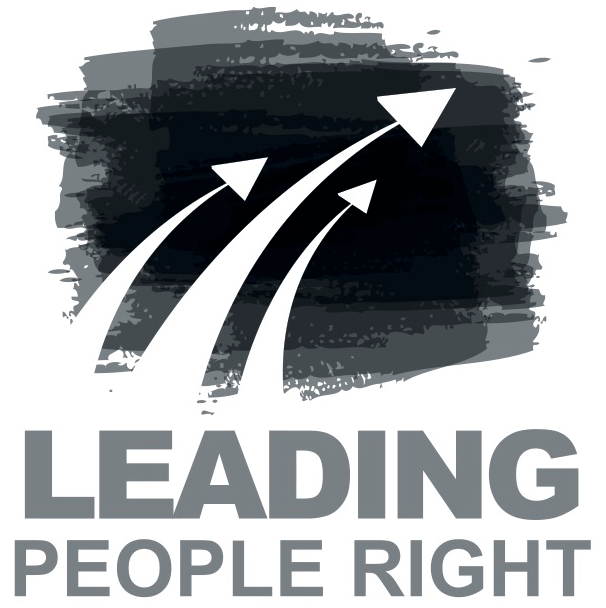
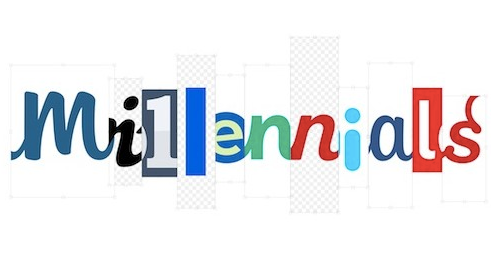
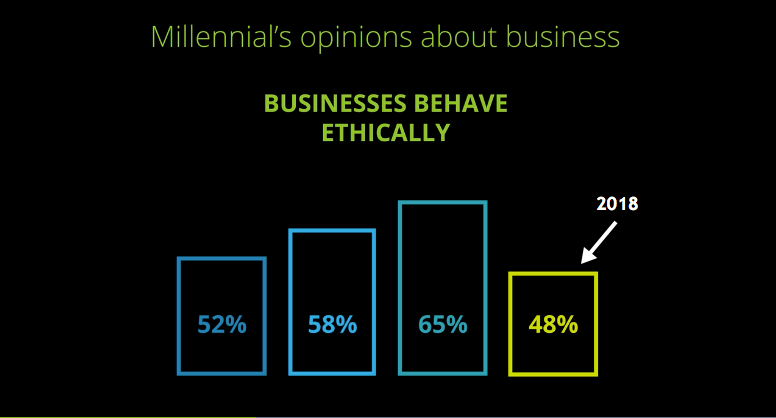
Great article!
Thanks Alejandro. Glad you found it valuable!